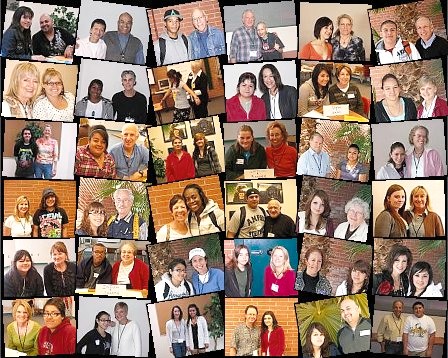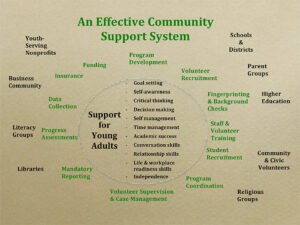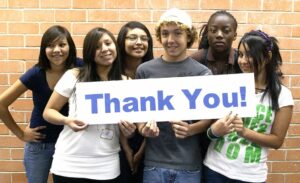Reflections
We would like to share our observations and learning with a deep sense of gratitude for all of those who supported our dream. We are in awe of the resilient and inspiring adolescents TPC supported with coaching conversations over the years.
We invite you to use any of the documents and information in this website as a resource for bringing coaching opportunities to youth in your community — for whatever you sense and envision the highest possible outcome to be.
Our wish is that you can generate sustainable results supported by your ability to execute and lead effectively. May you embody your vision, passion, and values to your core.
What is the ultimate difference you wish to make in the world?
How it began — coffee with Joan
Joan Hillebrand Alexander brought the vision to Tucson. Having “coffee with Joan” meant that you, too, would be caught up in her enthusiasm for the result Basic Coaching Conversations could have for students. Joan’s mantra from her background in educational reform was “If students were motivated and focused, they would be ready to learn.” As a complementary resource to education, coaching could enhance a student’s motivation and focus.
Joan provided her expertise from marketing, education, and Executive Coaching to get the program underway. Her attention to detail and years of work in the domain of coaching provided the backdrop for the infrastructure of forms and processes we used to begin the program.
The School
The Amphitheater School District in Tucson, Arizona, and the principal at the school, Patsy Harris, opened the door for us. A host of concerned citizens on our beloved “construction crew” worked tirelessly. They firmly believed that coaching conversations would support and inspire students as Joan’s mantra declared.
Sandy Spiewak, the head counselor and freshman counselor at the school, was the “champion and ambassador” for TPC. She said:
Our teens today need extra support. The unconditional belief and positive regard for each of our students provided by the Touch Point Connection coaching program is vital for that support.
I wish every one of our teens could have a coach.

Our Volunteers
We were also blessed with the most dedicated and passionately engaged volunteers any organization could desire. As Success Coaches, they consistently desired to learn coaching skills. They not only resonated with our Vision, they had an unbridled enthusiasm to coach. And with patience and care, they authentically connected with the teens.
One of our coaches said,
After our last coaching conversation my teen decided to work on a new project. When we met again it was wonderful to see her glowing. I have never seen her so confident.
The commitment of our volunteers not only supported teens, but coaching gave them increased meaning in their lives. They enjoyed the challenges and opportunities for personal growth as well. As they reported, their own levels of awareness, listening abilities, and communication skills were amplified by practicing the concepts of coaching conversations. A sense of community developed among them that resonates today.
Volunteer Success Coaches and their teens produced an inter-generational environment of understanding and discovery based on mutual trust and respect. Daniel Siegel, M.D., states in his book Brainstorm, “The key is how we can all work together, across the generations, to honor this essence of adolescence, to discover and cultivate the hidden power and purpose of the adolescent mind.” The leaders of Touch Point Connection never anticipated this added benefit when we began the program.

Afterthoughts and the Learning
Touch Point Connection’s history of development was met with excitement in the community. We approached nonprofit agencies assisting youth, the public library system, schools, and parent organizations. However, the capacity to support our mission wasn’t as broad or sustainable as we would have desired.
Borrowing from the work of Peter J. Denning and Robert Dunham in their book The Innovator’s Way, we point out these concepts that may assist you:
- Invention is the creation of something new — Developing new ideas and fostering research
- Innovation is the art of getting people to adopt change — New practices adopted by a community
The work of Invention is:
- Sensing: Bringing forth the new possibility that would bring value to the community
- Envisioning: Building a compelling story of how the world would be better if the possibility were made real
The work of Innovation (adoption) is:
- Offering: Presenting a proposed practice to the (leaders of the) community who commit to considering it
- Adopting: Community members commit to trying out the practice for the first time
- Sustaining: Community members commit to staying with the practice for its useful life
Denning and Dunham go on to suggest that these concepts above work dynamically and in parallel with the practices of Executing, Leading, and Embodying… “to blend with others in moving them towards adoption…”
As Touch Point Connection invented and innovated, we encountered barriers and hurdles we failed to “see”; and we faced “breakdowns” characteristic of a developing organization.
The elements of developing a Not for Profit 501(3)c (or what we like to call a Community Benefit Organization) consisted of the following:
- Filing appropriate paperwork, Articles of Incorporation, and Bylaws
- Developing a Board of Directors, Budget, and Operating Procedures
- Establishing a clear Vision and Mission as a road map for success
- Creating a Development Plan with effective fundraising activities
- Providing outreach and marketing; for fundraising, engagement and buy-in
- Finding collaborators, ambassadors, and champions to build capacity
- Creating the program and working principally with a volunteer workforce
- Recruiting, training, and supporting Volunteer Success Coaches
- Hiring personnel
- Collecting quantitative and qualitative data collection and assessments to validate our Vision and Mission
Our passion, dream, and dedication to the belief that youth matter and coaching was a means to allow them to “thrive” drove us to provide services for five years. Now, our desire is to share this information for others to use in creating their own opportunities to coach youth.
It is with a sense of sadness that we ended our programs. We also felt a deep sense of satisfaction and accomplishment. We had recruited, trained, and supported over 50 Volunteer Success Coaches who were personally affected by the experience. They continue to use the processes of Basic Coaching Conversations in their relationships.
We awakened the community to the possibilities that exist to support adolescents and shared our Vision; Through the power of coaching, Touch Point Connection envisions youth who become self-reliant, confident and responsible, and whose contributions and choices as engaged citizens positively impact the quality of life for them and their community.
Most importantly, we firmly believe that amongst the more than 120 students we served, many seeds were planted. These seeds will put those teens in the “driver’s seat” of their lives, to create choices and opportunities they would not otherwise have seen, and ultimately thrive.
We acknowledge their trust in the process, their curiosity, their courage to explore, and their intention to build their futures.
10 Questions for Your Reflections

- Do you hold to an integral view involving business, agencies, government, and the community that will be affected?
- Does the end-user (such as a school or agency) perceive a need for your services?
- Is your “offer” filling a “void” e.g., satisfying the needs, values, and concerns of the end user? How well do you know your end user?
- Does your passion and value for what you are doing meet with the passions and values of the end-user? Do they believe what you believe?
- Is there a commitment to a mood of trust — mutual sincerity, reliability, competence, and care?
- From the work of Hildy Gottlieb and Creating the Future creatingthefuture.org
- Do all parties share the same future; the same vision; the same highest possible outcome? What is the ultimate difference that can be achieved?
- Is there an integral understanding of what holding that outcome can make possible? With the same levels of commitment and enthusiasm?
- Does everyone understand and embody the work necessary to establish the conditions to make the program work for the highest possible outcome?
- Do you have an “ambassador” connected with the end-user who champions the cause?
- Is there a clear “agreement” by all parties?
- Is there “solid” acceptance of your proposal by the end user? Are commitments “solid” and clearly understood by all parties that will coordinate and generate actions towards a shared outcome?
- “All actions come from prior conversations” (Dunham). Have your conversations been supportive and clear to produce co-designed agreements? Are there any “missing” conversations?
Adopters face risk, uncertainty, fracture of the familiar, incentives to preserve the status quo, and hard work to integrate the changes into their world. —Denning and Dunham
Ideation is NOT the real problem in innovation; it is how to mobilize action around an idea. —John Seely Brown, former chief scientist, Xerox Corporation
 Innovators are leaders who are adept at the art of conversations that create agreements, commitments and promises. They generate a coordination of actions towards a shared future based on aligned values and care.
Innovators are leaders who are adept at the art of conversations that create agreements, commitments and promises. They generate a coordination of actions towards a shared future based on aligned values and care.
If you desire to support youth with coaching conversations, we wish you the best on your journey. May the information you find here light the way.


